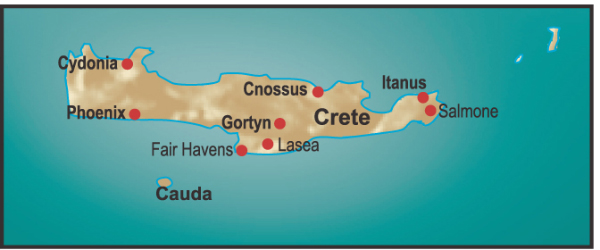Titus
by S. M. Baugh
■ AUTHOR: The apostle Paul.
■ DATE: ca. A.D. 66 (just before Paul’s second Roman imprisonment?).
■ VENUES: Paul on his way to or in Nicopolis in Epirus (western Greece), writing to Titus on the island of Crete.
■ OCCASION:
• To give Titus specific and general instructions for his ministry in Crete.
• To remind Titus of Christian doctrines and ethical teachings.
• To warn against false teachers and apostate brothers.
The Occasion for Paul’s Letter to Titus
I have already addressed briefly the issues of Pauline authorship and the probable background scenario for the composition of Titus (see the introduction to 1 Timothy). The letter to Titus was probably written between the time of Paul’s first trial in Rome as narrated in Acts and a second Roman trial that forms the background to the writing of 2 Timothy. Paul’s witness in Crete while on his way to Rome the first time (Acts 27) had formed an embryonic church, which he would naturally have wished to firmly establish upon his release. He had left Titus in Crete to carry on the work (Titus 1:5) while he himself set off for Nicopolis in western Greece. It was after this second, longer stay in Crete that Paul wrote the letter to Titus. Whether Paul wrote it from Nicopolis or while on his way there (or whether he arrived there at all) is unknown. But the main concerns of Paul in this letter show his concern that Titus be further equipped for his ministry to the church on Crete and to give him various other personal instructions.
Paul intends to send either Artemas (otherwise unknown) or Tychicus to take over the work in Crete so that Titus can come to join him in Nicopolis before winter sets in.1 As mentioned, Paul is either already in Nicopolis or about to go there.
There were several places named Nicopolis in the Greek world. The word means “Victory City” and was the name of cities founded by Alexander, Pompey, and Augustus to celebrate their military successes. This Nicopolis is the one on the western coast of Greece in the province of Epirus (about 200 miles west and slightly north of Athens), founded by Augustus in 31–29 B.C. to celebrate his victory over Mark Antony. It was a Roman colony—meaning that it was originally a source of land grants for Augustus’s veterans on their discharge. This city served as the regional economic and administrative capitol of the province of Epirus. Paul would naturally have gone there if he were going to Rome or returning from there.


THE MEDITERRANEAN WORLD AND THE ISLAND OF CRETE
